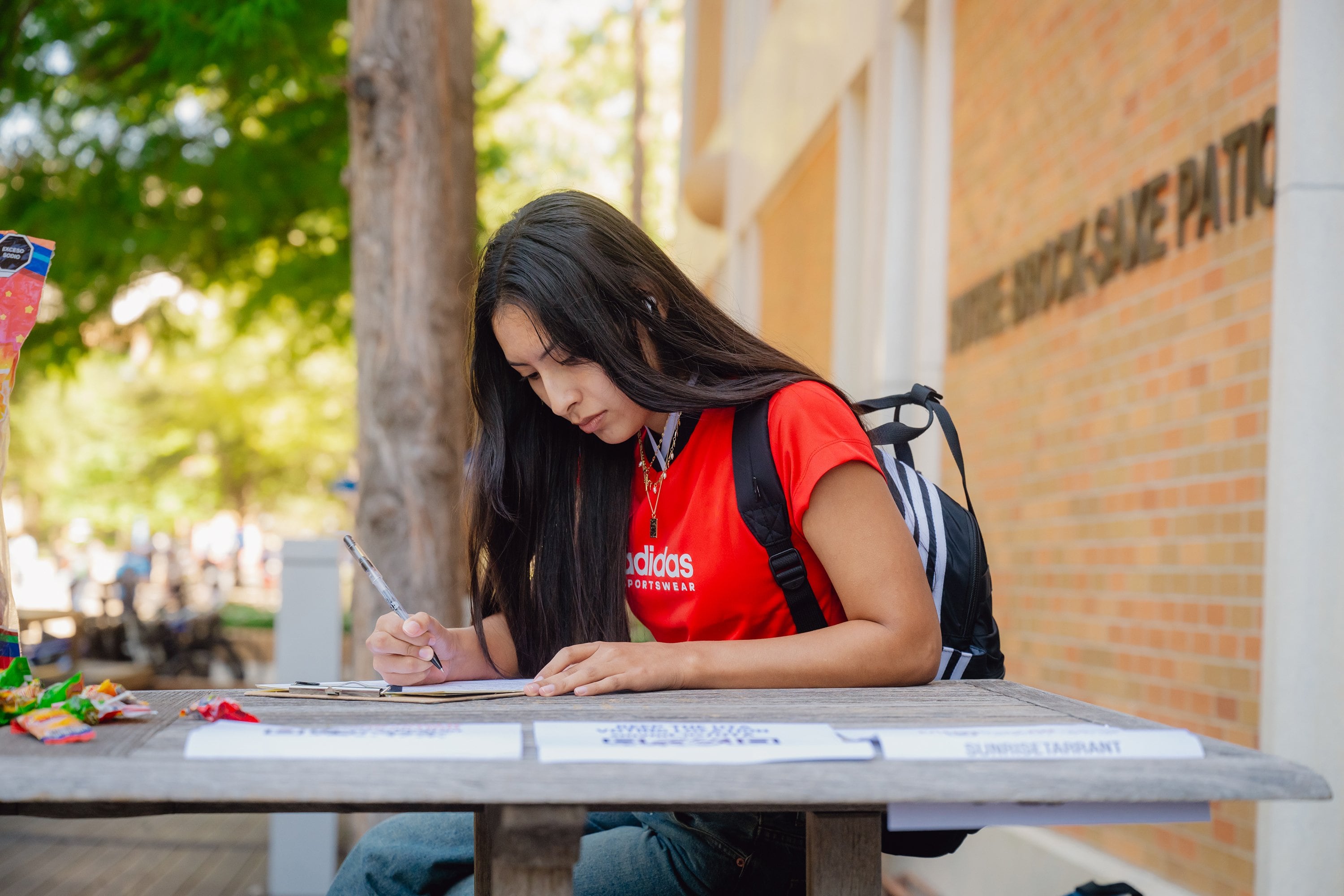This article was first published by The Texas Tribune, a nonprofit, nonpartisan media organization that informs Texans — and engages with them — about public policy, politics, government and statewide issues. Sign up for the We the Texans newsletter to receive twice-monthly updates on the year-long initiative dedicated to boosting civic engagement and chronicling how democracy is experienced in Texas.
An effort by some Republican officials to curb access to early voting on college campuses in Tarrant County failed Thursday, after the Tarrant County Commissioners Court voted to keep the polling sites in place.
The push to limit the voting locations was led by Judge Tim O’Hare, a Republican and the chief elected official of the county. He said the measure was intended to save money because those poll locations had low voter turnout. Democrats on the commissioners’ court and local voting rights advocates called the effort an attempt at voter suppression targeted at people of color and younger voters who tend to be more liberal.
O’Hare has said it isn’t the county’s job to make it easier for specific groups to vote.
The two-week debate culminated in a 4-1 vote in favor of a list of polling locations that instead added a new site. O’Hare, who as county judge gets a vote on the commission, was the only vote against.
The vote will allow polling locations to remain at several locations, including at the University of Texas at Arlington and Tarrant County College campuses. Early voting runs from Oct. 21 through Nov. 1. Election Day is Nov. 5.
Tarrant County GOP Chair Bo French condemned the vote in a social media post and promised that grassroots GOP voters and activists would not “forget which of our elected officials stood with them and which of them chose to side with the Leftist mob.”
In a newsletter last week, French wrote that reducing polling sites would be “a serious win for Republicans in Tarrant County.”
The voter access debate in Tarrant County — Texas’ largest swing county — comes as top GOP leaders have tried to block county efforts to increase voter registration and spread unproven claims of illegal voting for the past few weeks. Election experts say they’re worried those efforts could undermine trust in state elections and lead to voter suppression.
Texas House Democrats, students, and community leaders spoke out against the effort at a news conference Wednesday at the University of Texas at Arlington, calling it a conservative power grab.
“[Republicans] see Tarrant County and Texas slipping away from them,” said State Rep. Chris Turner, a Democrat from Grand Prairie. “They’re desperately trying to cling to power.”
About 10% of the ballots in Tarrant County during early voting in the 2020 presidential election were cast on college campuses, according to the county’s data. The UT-Arlington early voting location had 9,754 votes cast in that election, in which President Joe Biden became the first Democratic presidential candidate to win Tarrant County since Lyndon B. Johnson.
Beto O’Rourke won the county in his failed 2018 bid to unseat U.S. Sen.Ted Cruz.
Texas has the second youngest median age of any state other than Utah. Vice President Kamala Harris’ entry into the presidential race has helped activate Texas’ young voters, which political experts say could help close the enthusiasm gap between Democrats and Republicans in the state.
Rogelio Meixuerio, a student at UT-Arlington, said he’s glad O’Hare’s effort failed, but he still worried what’s happening in Tarrant County could embolden Republican leaders in other counties.
“O’Hare is working to keep Tarrant County under Republican control,” Meixuerio said.
Derek Tisler, senior counsel at the Brennan Center for Justice’s Voting Rights Program, said removing early voting locations and having fewer of them could significantly increase wait times on Election Day.
“Election administration involves a lot of careful planning, and disruptions like this have unintended consequences and spillover effects on all voters throughout the community,” he said.
This isn’t the first time Republicans have had issues with college voting locations. During the last legislative session, Republican state lawmakers tried to pass a bill that banned counties from putting any polling locations on college campuses.
Amber Mills, an organizer with MOVE Texas, a nonpartisan voting advocacy group, said removing campus sites would negatively affect students with disabilities or without reliable transportation. Arlington is the largest city in the state without public transit.
Claudia Yoli Ferla, executive director of MOVE Texas, celebrated the county commissioners’ vote on Thursday.
“Colleges and universities are key community institutions that provide accessible facilities for the public. We are excited that UTA students will continue to have a reliable, central location to cast their ballots safely,” she said. “Young voters have consistently turned out in high record numbers. Their energy and dedication to our democracy are undeniable and show no signs of slowing down.”
Meixuerio said he’s now more energized than ever to get more students registered to vote.
“I don’t care who people vote for,” Meixuerio said. “I just want them to vote.”
Juan Salinas II is a Texas Tribune reporting fellow based in Arlington.
The Texas Tribune is a member-supported, nonpartisan newsroom informing and engaging Texans on state politics and policy. Learn more at texastribune.org.






